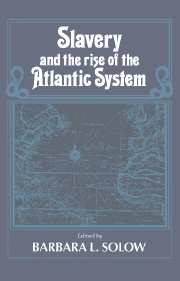Book contents
- Frontmatter
- Contents
- Preface
- List of contributors
- Introduction
- 1 Slavery and colonization
- 2 The Old World background of slavery in the Americas
- 3 Slavery and lagging capitalism in the Spanish and Portuguese American empires, 1492–1713
- 4 The Dutch and the making of the second Atlantic system
- 5 Precolonial western Africa and the Atlantic economy
- 6 A marginal institution on the margin of the Atlantic system: The Portuguese southern Atlantic slave trade in the eighteenth century
- 7 The apprenticeship of colonization
- 8 Exports and the growth of the British economy from the Glorious Revolution to the Peace of Amiens
- 9 The slave and colonial trade in France just before the Revolution
- 10 Slavery, trade, and economic growth in eighteenth-century New England
- 11 Economic aspects of the growth of slavery in the seventeenth-century Chesapeake
- 12 Credit in the slave trade and plantation economies
- Index
5 - Precolonial western Africa and the Atlantic economy
Published online by Cambridge University Press: 20 October 2009
- Frontmatter
- Contents
- Preface
- List of contributors
- Introduction
- 1 Slavery and colonization
- 2 The Old World background of slavery in the Americas
- 3 Slavery and lagging capitalism in the Spanish and Portuguese American empires, 1492–1713
- 4 The Dutch and the making of the second Atlantic system
- 5 Precolonial western Africa and the Atlantic economy
- 6 A marginal institution on the margin of the Atlantic system: The Portuguese southern Atlantic slave trade in the eighteenth century
- 7 The apprenticeship of colonization
- 8 Exports and the growth of the British economy from the Glorious Revolution to the Peace of Amiens
- 9 The slave and colonial trade in France just before the Revolution
- 10 Slavery, trade, and economic growth in eighteenth-century New England
- 11 Economic aspects of the growth of slavery in the seventeenth-century Chesapeake
- 12 Credit in the slave trade and plantation economies
- Index
Summary
SCHOLARS researching the origins and development of the Atlantic economy tend to be more interested in the contribution of precolonial Africa to the Atlantic economy than in the importance of that economy to Africa. The vital role occupied by Africa in the development of the Americas is beyond question, yet that contribution cannot be understood fully without an awareness of the significance of transatlantic trade to Africans. Most scholars with an “Atlantic” orientation would probably argue that transatlantic trade ties affected Africa as profoundly as they affected the Americas, though in obviously different ways. The shift in the 1970s toward a new focus on that part of the historical African economy producing for domestic consumption, as represented by Curtin's work on Senegambia and Peukert's on Dahomey, seems to have halted. Recently, both detailed regional studies and continentwide syntheses have returned to an older concern with the effects on Africa of the slave trade, its abolition, and the subsequent rapid increase in transatlantic produce exports.
This more recent concern with external trade is firmly rooted in the quantitative work of the last two decades. Few scholars have failed to take advantage of numerous new estimates of volume and prices in both the slave and commodity trades. But despite this interest, most researchers have not aggregated the different data sources to arrive at estimates for particular African regions (as opposed to countries in Europe and the Americas). More important, they have not given center stage to the implications of these new data for the importance of the overseas economy to Africans.
- Type
- Chapter
- Information
- Slavery and the Rise of the Atlantic System , pp. 97 - 119Publisher: Cambridge University PressPrint publication year: 1991
- 5
- Cited by

